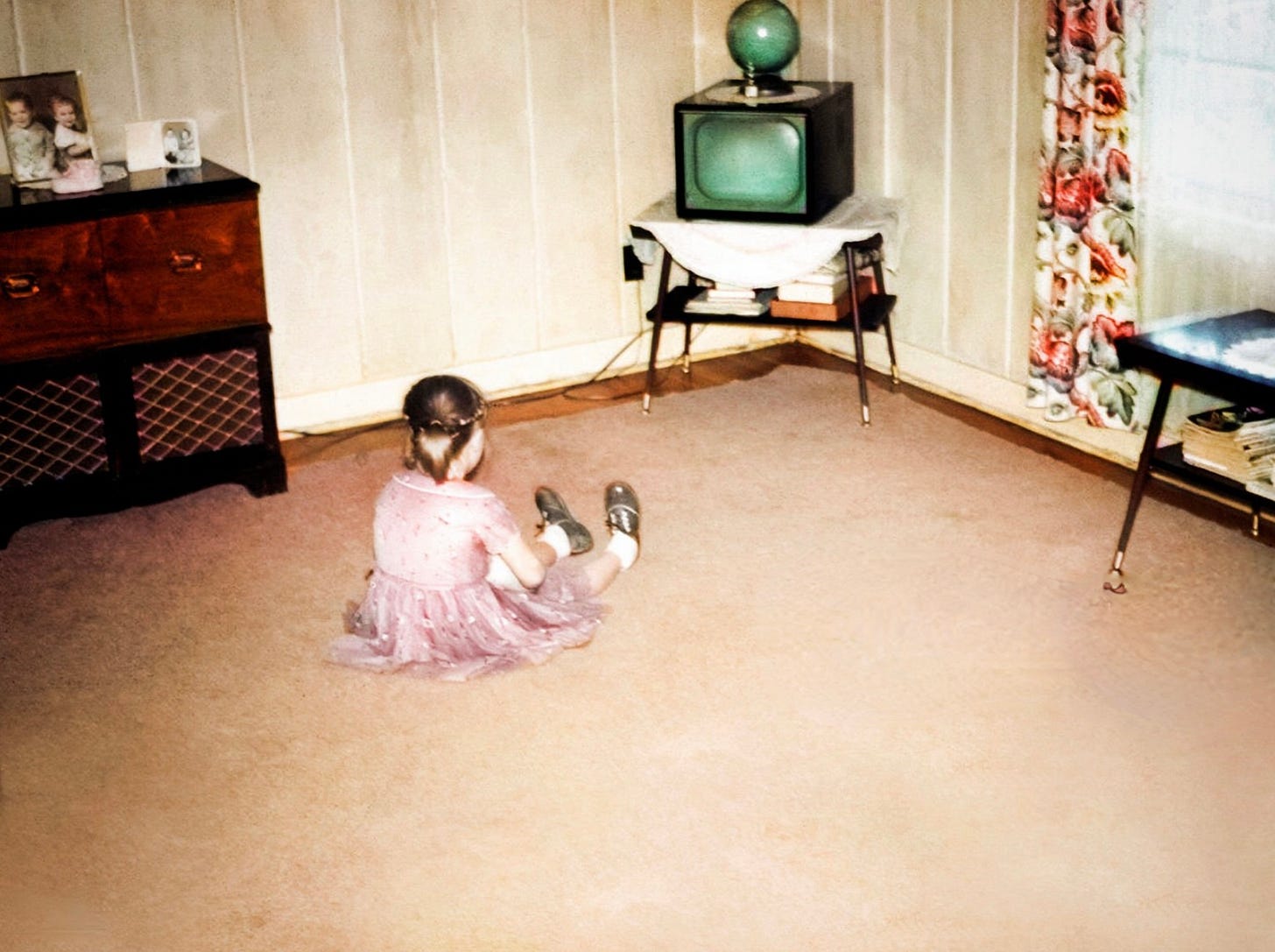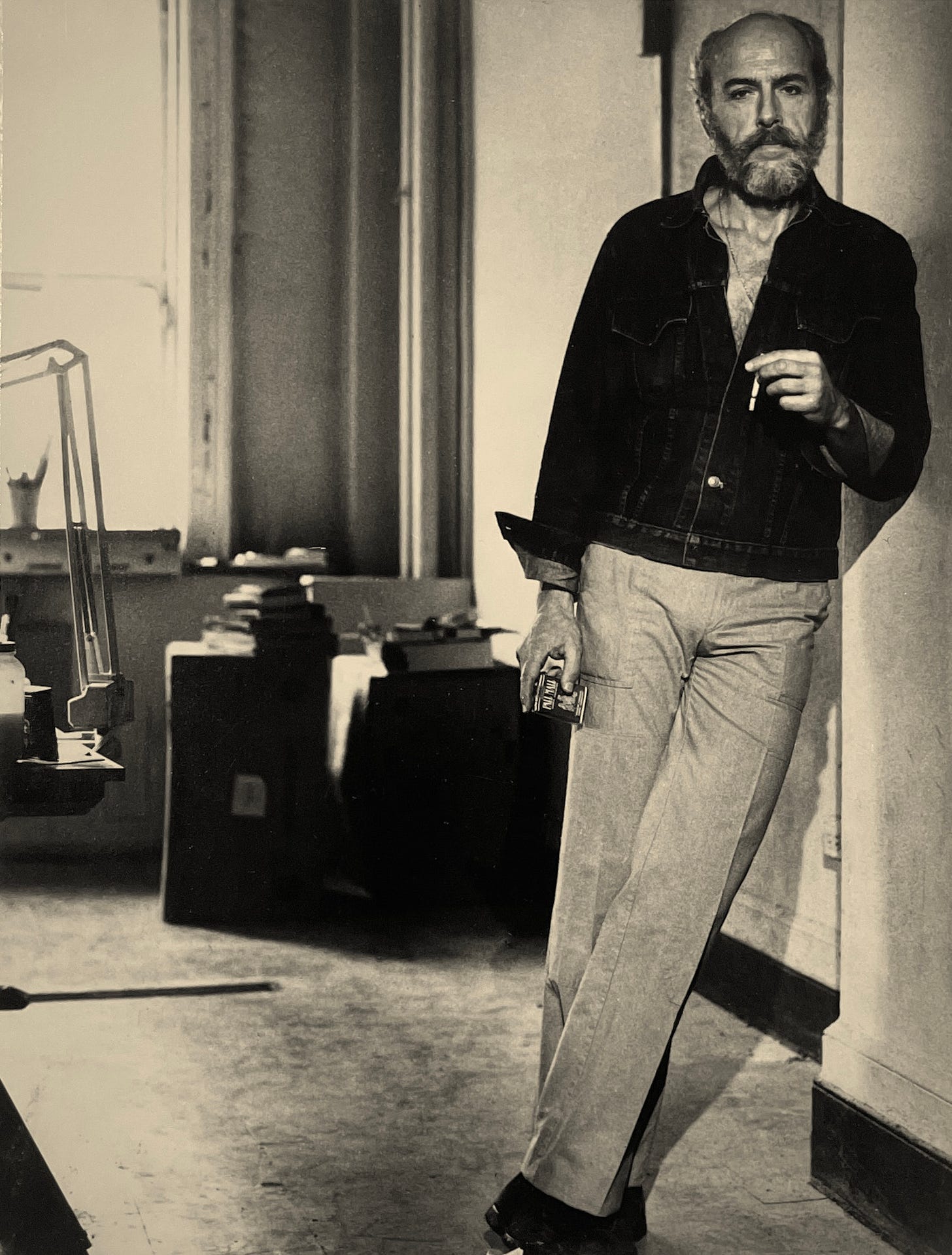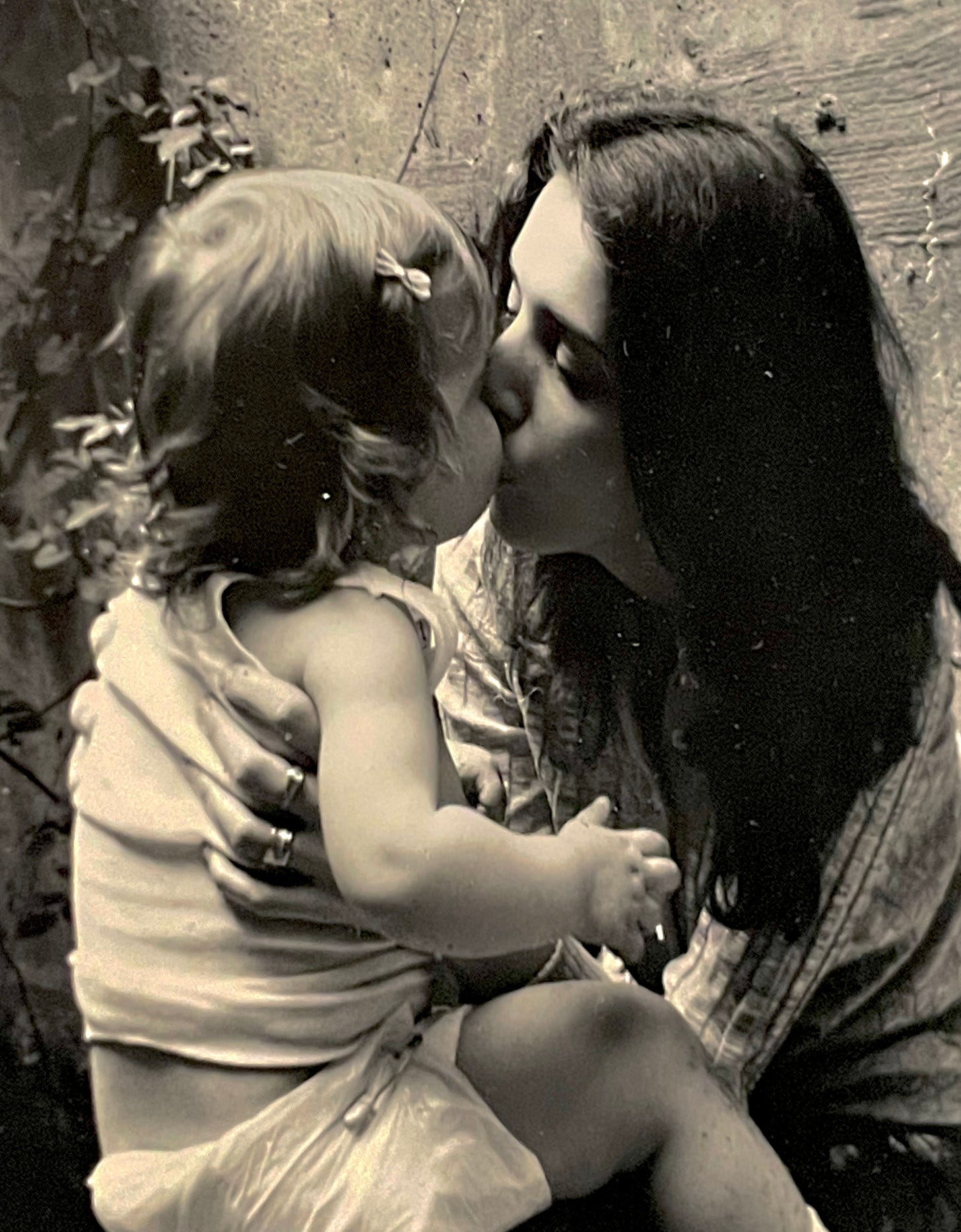Never Waiver
The tricky rules of engagement
One day about five years ago, back when my dad was alive and living in Raleigh with his fourth wife, he called me. It was clear right away that he was upset, and he didn’t waste time launching in. “Listen, Ally,” he said, “I’ve sent a lot of people to read your stuff and I need you to retract what you wrote in your last essay.” My mind started racing trying to remember what I’d written. It’s a weird affliction, and I don’t know if it affects many writers or just me, but I often can’t remember what I wrote, even the next day, even if it took days to write. As a result, I can usually read my own work as though someone else wrote it which has its benefits, but ask me to tell you about it in detail and I’m stumped. I knew he’d been in it, and I knew I’d written about how he took me along as a tiny child during his rampant womanizing sessions, but I couldn’t remember all the specifics. I assumed it was the womanizing part he didn’t like. I was wrong. The part that had upset him was a retelling of a walk we took later, when I was sixteen, during which he misheard me and smacked me “upside the head” as they say. He struck me so hard my ear was ringing for half an hour. I’ve written about this moment before.
“But, Dad,” I said, “you did hit me, and it did hurt.” I was amazed that he was fine being described as this massive serial adulterer and pretty awful dad, but god forbid I mention anything about his anger issues. I think he took some pride in sleeping with so many women, and simply didn’t realize how many people would recoil in horror at the thought of bringing your kid along for the ride, even if your kid was sitting in front of a tv in the other room. In his mind, the hitting was the thing that made him look bad. “I would never have hit you hard,” he said, “I mean, I don’t even remember this, it’s like another lifetime.”
That was the same line he’d used when I wrote my book, and my publisher at the time required I get a waiver from both my parents. Imagine spending a year writing a book that includes some painful chapters from your childhood, and then having to get your parents to sign off on it. What could be more fun? “Look, Dad, I’ll go back and reread what I wrote, but you absolutely hit me, and not gently. It stands out because you only struck me twice in my life. I’m not confused.” In the end, I removed the word “hard” to appease him. I knew how to appease, to freeze, to fawn, to go numb, to duck, to weave, to become invisible, and to put my parents’ feelings above my own, but I was getting pretty sick of it … and pretty sick from it. I was still working out how to write about my childhood, how to tell my own story without upsetting my parents. It had been a struggle, particularly with my mom who would never admit she was an alcoholic. In the book, I described her as “someone who loved chardonnay” which is perhaps the most euphemistic phrase I’ve ever written - and figured people would read between the lines, or fill in the missing lines - as one reviewer seemed to when he said I had “... a mother who dabbled in alcoholism.” I don’t know for sure, but I think dabbling in alcoholism is like dabbling in robbing banks or being pregnant. It’s a full-commitment endeavor, you’re all in or you’re all out. Nonetheless, the reviewer seemed to get it. It wasn’t the book I wanted to write, but it was the book my publisher wanted me to write. The truth is, I don’t think I could have written the book I wanted to write while my parents were alive. I know because I’m finishing the second draft of that book now, and there’s no way I would have felt free enough to tell the story while also worrying about my parents’ feelings. But back then, both of my parents signed the waiver, my dad with his senility disclaimer, and my mom with a comment about not loving every sentence, but assuming people would realize there’s more than one side to a story. At the time I remember feeling sad that it didn’t seem I’d ever have meaningful conversations with my parents about my childhood, but grateful that they weren’t going to block me from publishing a book.
I had pretty much given up on trying to mend my relationship with my dad. How can you work through things and gain a clearer understanding with someone who claims not to remember what happened? I knew it was pointless to ask him what on earth had made him think it was okay to bring me on dates with him, or involve me in his lies to my stepmom about our after-school activities. “We spent the afternoon at Barbara’s house! I banged Babs while Ally watched Little House on the Prairie in the living room, it was a blast!” Clearly he wasn’t going to say that. Instead he’d say we went to the museum or the playground, with the understanding that I would silently concur, or verbally back him up when needed. I knew my job, my job was to help him make sure my stepmom’s feelings wouldn’t be hurt. There was nothing to be gained decades later by asking him how he could not have known that talking to your four, five, six, seven, eight, nine, ten, eleven, twelve-year-old about your commitment issues and need to be free would create some big fucking problems for her to figure out in therapy, or some difficulty trusting men. You can’t have a fruitful conversation or expect any kind of apology from someone who claims not to remember most of what he did. With my mom, it was even worse. She absolutely refused to be wrong. She adamantly denied she had a drinking problem. She demanded that everyone close to her pretend the same. You literally cannot engage in any kind of meaningful exchange that might lead to deeper understanding and forgiveness with someone who is that invested in denying reality, but my god I tried. Once a decade or so I would call her out on her drinking. I so desperately wanted her to face it and get help, because I knew it was the big, ugly monster in the room. The one that kept us from being as close as I wanted us to be.
Since she refused to acknowledge that monster, it was somewhat funny that I thought if I just said the perfect thing or wrote the perfect, indisputable email with concrete examples and footnotes, she’d finally “see the light.” Have you ever done that? Spent hours or days trying to construct the exact right thing to say or email or text … only to finally say it and have it explode in your face, along with any hope that things might change? Each time I thought, this time will be the time. This conversation will be the one. When I say this or write this or explain this to her in just this way, she’ll finally have to face the monster, and I will have saved us both. But it never happened.
I don’t know how many of you watched Happy Days, one of the whitest shows in history, (were there even BIPOC in the 50’s? Not according to Happy Days!) but if you did, you will undoubtedly remember the theme song and the fact that the Fonz could never say he’d been wrong or that he was sorry. Come to think of it, he was also a rampant womanizer, so there’s a theme here. In the show, this affliction of his was funny to behold. In life, when people can’t say they’re sorry and can’t admit when they’ve made a mistake or many, many mistakes, it’s not funny. You will not haha about it. But you might waste a lot of time and energy trying to get through to them, and that, my friends, is something to avoid. There is no perfect sentence, you will not bring anyone like this into the light, and if you try and fail a thousand times and keep heading back into the ring, it’s you, hi, you’re the problem, it’s you. Anyone who loves an addict or someone with a personality disorder that precludes empathy and accountability has been the problem at some point or another. How do you not try? How do you not throw yourself in front of your loved one and do anything and everything you can to try to get through? It’s when you’re still doing it a million tries later that it’s a problem.
There are people who are working hard to maintain an outward façade, not just for the outside world, but for themselves. Self-loathing and crushing self-doubt, fear of rejection, abandonment, discovery, fear of being seen as less-than or fallible can make some people so afraid and uncomfortable, they will do anything, say anything, believe anything or construct any narrative to avoid having to face their own humanness. Those people are in a lot of pain. They are also incredibly hard to deal with, as you may well know. Your perfect email isn’t going to touch any of that, but it might unleash a lot of their pain or rage, and it probably won’t be pretty. I don’t know if you’ve ever gone a round with someone whose narrative about themselves is more important to them than anything else, but it’s exhausting, dangerous, and futile. I’ve had a few people like this in my life - they go for the jugular, but it’s only because they feel like a cornered animal even if you’re just hoping for a reasonable apology. They will come out of left field with something that happened three years ago, or latch onto the one thing you said in not exactly the way you meant. They’ll bring out their list of ways you’ve let them down, a list years-long they’ve been keeping for just this moment. They will deflect, attack, manipulate, storm out, yell, possibly become violent, but never communicate in a way that feels satisfying or makes you feel understood or respected or cared for, or any of the basic things any of us want when we’re feeling hurt, scared, or confused by someone’s behavior. And your only options will be to give up, walk away, take cover or make yourself invisible. Until you learn not to get in the ring in the first place.
Clearly, most of us would choose not to have people like this in our lives because it is painful and exhausting. But sometimes we’re talking about family members, people you do not want to cut out of your life except as a last resort. Or we’re talking about loving an addict, which is one of the most devastating, powerless, heartbreaking experiences a person can have. My once-a-decade attempts to have the real conversation with my mom never went well. It wasn’t a conversation she was going to have, so it only ever caused us both a lot of drama, rage and heartache. It wasn’t until she was on her literal deathbed that she relented and understood her drinking had been the issue between us, along with a lot of woman-rage I think she sat on, except when she unleashed it on me, her daughter. I now sometimes wonder if her rage surprised her, if she didn’t know what to do with it, if she was blasting it on me like a question. Boundaries are your only hope when you have someone in your life who can’t be wrong or won’t look at their own participation in a dynamic that hurts. You’re never going to change other people, but you can change the way you interact with them. I’m writing this as if it doesn’t hurt like hell, but that’s only because I did it for so long, it lost the sting. And because the person who required me to erect and uphold my boundaries the most is also the person I would give just about anything to have one last afternoon with, one last conversation, one last laugh, one last phone call, one last hug. One last anything. These are the people who break your heart, but if you’re going to love them, you have to find a way to make sure they don’t break your spirit - that’s when you’re really in trouble.
Short of that - short of the people you might be willing to have your heart broken over - the rest of the people who can’t communicate in a reasonable, respectful way need to be kept at arms’ length because they will suck the life-blood out of you. Then when you’re purple on the floor they’ll watch the light go out in your eyes as they keep screaming about how right they are. You don’t want to die like that, even if you’re only dying on the inside. Communicate what is necessary in as few words as possible, but do it like it’s a business transaction, like you’re talking to a professional acquaintance. In other words, don’t go to the hardware store for apples! Save your heartfelt communication for people who can meet you on that field and respond in kind, because that’s the field where love can grow. It’s really the only field you want to be on. You don’t need boxing gloves there, or a perfect email. You don’t need to drag anyone into the light, because they’re already soaking it up. You don’t have to worry about saying the wrong thing because they won’t expect you to get everything right every second, and there are no eggshells on the field I’m talking about. There’s sun when you want it, and shade when you need it, there’s probably a babbling brook you can sit by, and if you’re very lucky, a hand you can hold when you feel alone. I wouldn’t waste too much time with anything else. I don’t know what happens when we die. I’d like to believe in some kind of continuation of consciousness. I’d like to think my parents might be somewhere, sitting in that field and having real conversation, because none of it matters anymore. That’s the funniest thing - we’re here for an instant. We get really caught up in a lot of things that don’t matter at all, like being right, and then we die. There are probably better ways to ride the ride. Being right doesn’t feel nearly as good as being happy. If you’ve been spending time writing the perfect email, delete it and go dig your toes in the grass.
If you’d like to meet me in real time to talk about how to create boundaries when needed, how to stop writing “the perfect email”, and how to be gentle with yourself, I’ll be here 1/19/24 at 11:15am PST, or you can wait for the Come As You Are podcast version. If you’d like to meet me in Portugal in June, it’s going to be amazing and I’d love that so much!






Once again you go into the details that is required to bring us into our healing processes and flush out what’s not ours. Thanks for sharing your experience and shining a bright light on this journey of self care and healing. Blessings ☀️✨🫶🏽
Beautifully written xx Always honest and on point. Thank you 🙏 much love to you ❤️ xx